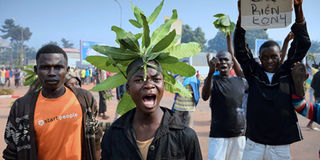To keep peace, Igad needs teeth to bite

Anti-Seleka protesters shout slogans on their way to the Mpoko airport during a demonstration calling for the resignation of the Central African Republic president in Bangui on January 10, 2014. Michel Djotodia stepped down under regional pressure. The pattern taking shape is one of a dangerous situation, with a regional trend towards autocracy and conflict. AFP PHOTO/ERIC FEFERBERG
What you need to know:
- Increasing disregard for citizens’ rights by governments across the region have all provoked significant concern.
- My point here is that regional integration has encouraged East Africans to recognise the ways in which states, economies and everyday lives in the region are connected.
- The same old faces thinking about the north in the same old way is not good enough.
Scornful of the ‘Africa Rising’ narrative, numerous writers in this newspaper and others have raised the alarm in recent weeks.
Increasing disregard for citizens’ rights by governments across the region, Al Shabaab’s stubborn survival, bloodshed in the Central African Republic, violence in the Democratic Republic of Congo, and the outbreak of war in South Sudan have all provoked significant concern.
Commentators are busily joining the dots connecting these different crises.
The pattern taking shape is one of a dangerous situation, with a regional trend towards autocracy and conflict.
Whether such an analysis is correct or not is a matter for another day.
My point here is that regional integration has encouraged East Africans to recognise the ways in which states, economies and everyday lives in the region are connected.
But greater recognition of this fact is still needed, particularly by policymakers.
To make this point, I have picked out three stories reported in the Kenyan press over the past month or so: Francis Muthaura’s appointment to head up the LAPSSET parastatal; violence across northern counties; and the conflict in South Sudan.
Each is an interesting and important story in its own right.
But thinking about each separately risks missing some of the great challenges that infrastructure development and regional integration are creating.
The rights and wrongs of Muthaura’s appointment have been much debated.
The willingness of the government to accept the predictable criticism of Muthaura is evidence of just how important infrastructure development is taken at the very top of the Jubilee government.
‘The project will define my legacy as president of Kenya’, President Kenyatta has said specifically about the new Nairobi-Mombasa-Malaba railway.
His statement applies more widely to the other large infrastructure projects currently underway, of which LAPSSET is the biggest of all.
It is that scale that makes Muthaura’s appointment particularly problematic.
As I have written on several occasions before, northern Kenya is no longer a buffer zone on the periphery.
Infrastructure development and oil exploration mean the north will become part of the heartland of the country’s economy.
That transformation means the state must reconsider the way it conducts its business in the area.
The same old faces thinking about the north in the same old way is not good enough.
New people, new ideas and new relationships need to be introduced.
Which brings us to the continuing violence in parts of northern Kenya.
Again, this is a topic that I have written about on these pages before. But my argument bears repeating.
We can’t continue to pay scant attention to the north or to what the state’s forces and officials do there.
If President Kenyatta believes oil pipelines and transport corridors will define his legacy, then he had better start to think of ways of ensuring peace and prosperity in the areas of the country in which such infrastructure will be constructed.
There is an obvious deficit in trust and a palpable sense of abandonment across the country’s northern frontier.
Devolution, which contains the promise for a reconstitution of the relationship between the state and its citizens in the north, is being implemented in a hesitant manner. New and creative efforts to resolve recurrent violence are needed.
The same can be said about foreign policy too.
Again, the Kenyan government’s response to the crisis in South Sudan has been to continue to conduct business as usual.
General Lazaro Sumbeiyo has been dispatched to Addis Ababa to join IGAD’s negotiating team in the peace talks.
The government has made regular statements expressing its concern about the gathering war.
But this is not the 1990s. South Sudan matters to Kenya in a way it has not done in the past.
Hopes that South Sudan’s oil will be exported through Lamu are an important part of LAPSSET.
Kenyan businesses and individuals have sizeable investments in South Sudan.
Ambitious regional trade and infrastructure plans demand a foreign policy to match.
The coordinated response by Igad and the organisation’s attempts to broker a peace deal in South Sudan is to be commended.
But once hostilities have broken out, there is little that any outside party can do to persuade the protagonists to abandon the nascent war.
More useful would be for Igad to take much more seriously its existing mandate to prevent conflicts occurring in the first instance.
Given the extent of regional integration, organisations like Igad need the power to more aggressively protect the region’s common interests from insecurity and instability.
Far greater use could be made of Igad by its member states to discuss matters of common concern, such as security in marginalised frontier zones now vital to infrastructure development.
Kenya’s economic growth, domestic security and foreign relations are now closely tied together.
The country needs its political leaders to recognise this and introduce and implement policy accordingly.
Prof Branch teaches History and Politics at Warwick University, UK [email protected]





